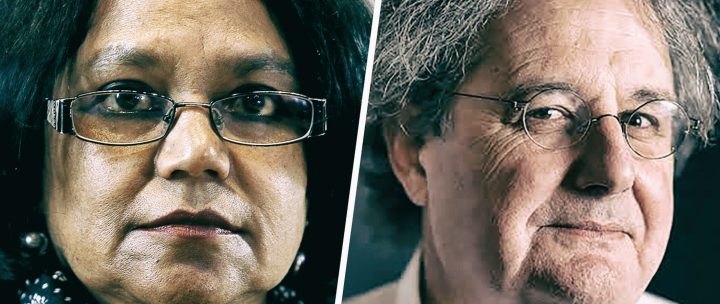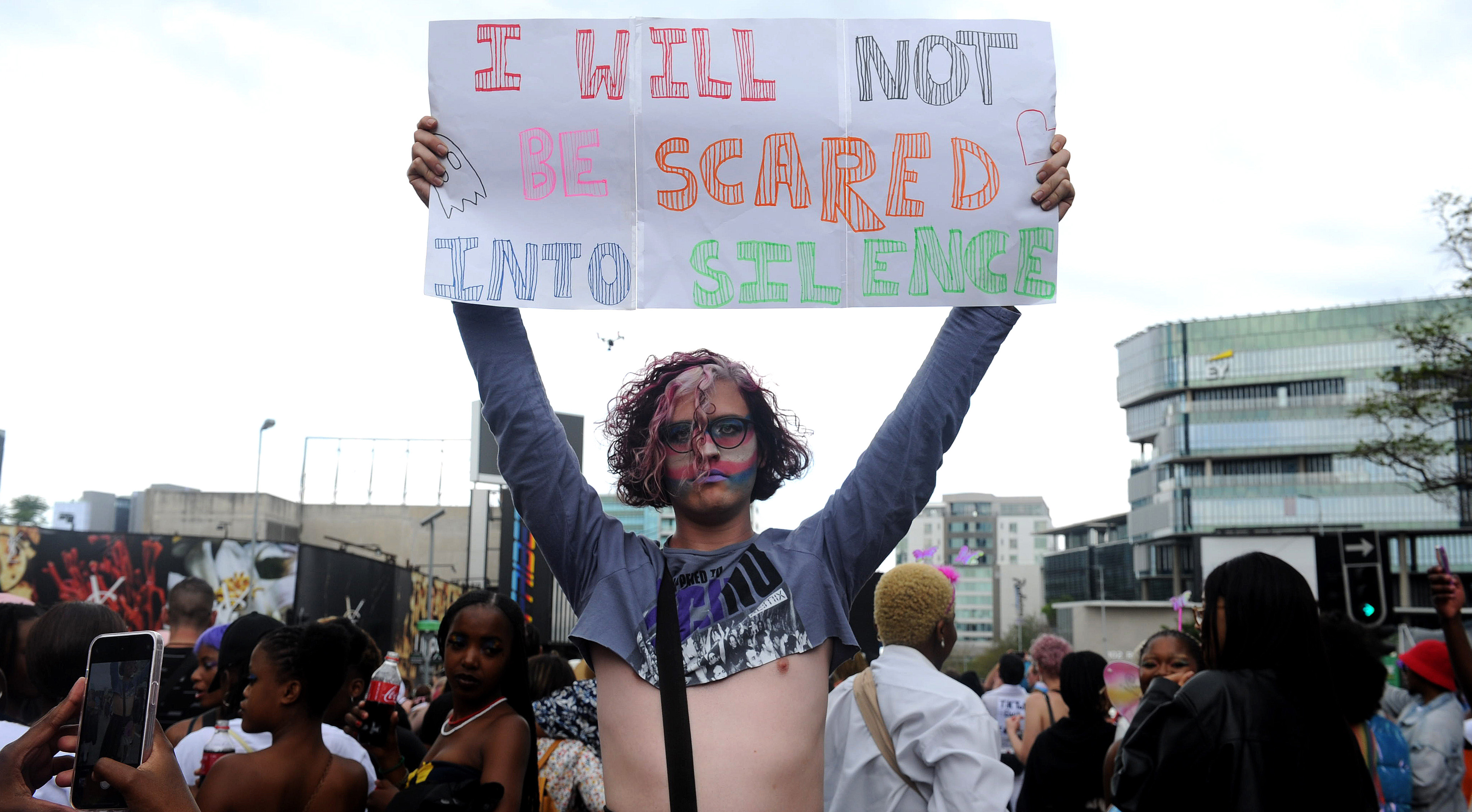LAWMAKING
New hate speech bill has ‘worrying’ flaws that could lead to self-censorship

A hate crime bill that was introduced in Parliament five years ago – and is now with the National Council of Provinces – continues to raise concerns among free speech advocates.
A hate crime bill that also criminalises hate speech is working its way through Parliament, but the legislation’s broadened definition of the terms “hate crime” and “hate speech,” as well as escalated penalties of up to eight years in prison, has free speech proponents worried that the bill could be weaponised.
Introduced in April 2018, the Prevention and Combating of Hate Crime and Hate Speech Bill lapsed in 2019, but was later revived and voted through the National Assembly in March 2023.

Participants take part in the Pride Parade in Johannesburg on 29 October 2022. (Photo: Gallo Images / Rapport / Elizabeth Sejake)
The bill is designed to expand upon Section 16 of the Bill of Rights, which gives citizens the right to free expression. The right does not extend to “propaganda for war; incitement of imminent violence; or advocacy of hatred that is based on race, ethnicity, gender or religion, and that constitutes incitement to cause harm”.
Section 36 of the Bill of Rights makes room for the limitation of rights, which allows for an ever-changing definition of Section 16. In 2021, former SA High Commissioner to Uganda, Jon Qwelane, was found guilty of hate speech for a homophobic column he wrote. It was ruled that his hate speech towards a certain sexual orientation fitted the parameters of propaganda.
Sexual orientation is not formally mentioned anywhere in Section 16, but through the Equality Act and Section 36, the hurtful language was deemed hate speech. Qwelane was fined and ordered to apologise in 2011. He died in 2020.
The new bill will further cement the criminalisation of hate-based crime and give a distinct ruling to mark hate-based crime as prosecutable.
Section 36 allows for the limitation of rights, but the subjective nature makes it difficult to set a precedent.
What does the bill say?
The proposed law’s goal is to try to prevent hate crimes and hate speech throughout South Africa. The South African Police Service does not currently distinguish hate-based crime in its quarterly reports.
The bill has seven key objectives that strive to prevent hate crime and hate speech, as well as “provide for the prosecution of persons who commit offences referred to in this Act and provide for appropriate sentences”.
Hate crime is defined in the bill as “an offence recognised under any law, excluding the common law offence of crimen injuria or an [act of hate speech]… committed by a person who is motivated by their prejudice or intolerance.”
Sixteen characteristics are listed as identities protected by this law: age; albinism; culture; disability; ethnic or social origin; gender; HIV or Aids status; language; nationality, migrant or refugee status or asylum seekers; occupation or trade; political affiliation or conviction; race; religion; sex; sexual orientation, gender identity or expression or sex characteristics and skin colour.
Hate speech is defined as, “Any person who intentionally publishes, propagates, advocates, makes available or communicates anything” that could be interpreted as harmful or promoting hatred.
Four exceptions are given to the ruling:
- Artistic creativity that does not advocate for hatred.
- Any academic or scientific inquiry.
- Fair and accurate reporting.
- Religious expression that does not advocate for hatred.
A report must be made via a “victim impact statement” detailing any consequences of the offence towards the victim, whether physical, psychological, economic, social, or garnering other negative effects.
Subjects found guilty of hate crime or hate speech face up to eight years’ imprisonment for a first offence. The previous version of the bill stipulated three years for a first offence and five for a second.
The bill’s ambition is to force accountability on those who commit hate-based crimes. According to Xenowatch, a crime-reporting database on xenophobia developed by Wits University, 1,011 incidents of xenophobia-based violence have taken place since 1994 – an average of just under three cases a month. In 2022, Xenowatch reported its second-highest total, with more than 100 incidents and 38 deaths.
According to a 2016 report from OUT LGBT Well-being, 44% of more than 2,000 respondents reported hate crimes in the two previous years, and 88% of cases went unreported. Legal accountability through the proposed bill, which includes a clause ensuring public education, should go some way towards putting the brake on hate crimes.
Kim Lithgow, CEO of LGBTQI+ rights group Same Love Toti, an organisation that has contributed to the bill’s content, emphasised the bill’s importance in protecting lives.
“This definition is strictly looking for the intentional, harmful hatred that promotes hatred against a certain group of people. Harm has also been clearly defined. This means that merely being offensive, or disagreeing with someone, or disliking something, or voicing an unpopular opinion, will not constitute hate speech.”
“Right now schools discriminate against LGBTQI+ youth. They are bullied, ostracised, expelled from school, or drop out of school because they are humiliated by peers and educators alike. LGBTQI+ are kicked out of their homes, assaulted and murdered and face discrimination on so many levels.”
“We need this bill desperately. We need people to go and voice their support for the bill. We need South Africa to take a firm stand against all forms of hatred and violence in this country. This bill will save lives. This bill will improve the quality of life for so many people.”
What are the bill’s limitations?
A webinar hosted by the Free Speech Union of South Africa was held last week to discuss concerns over the bill’s possible restriction of freedoms. On the panel was longtime journalist and executive director of the Campaign for Free Expression, Anton Harber, advocate Mark Oppenheimer and Cynthia Stimpel, executive director of Whistleblower House.
The central concern was the broad parameters for what qualifies as hate speech, expanding from four personal identities to 10. Also, the sentence of imprisonment for a first offence moves to eight years.
Harber and Oppenheimer were concerned that the threat of increased prison time would silence numerous conversations and work by journalists. Harber drew a comparison to media during the apartheid era, where heavy regulations made it difficult for publications to express their anti-apartheid viewpoints comfortably.
“It was the threat of serious consequences that had a chilling effect on journalists,” Harber explained.
The co-founder in 1985 of the anti-apartheid Weekly Mail said: “Generally, in the news, censorship was exercised by threatening consequences like closure, banning, imprisonment and fines if you broke the censorship law, and that had a really chilling effect because a lot of the media had to be extremely cautious as a result.”
The bill does include an exception to “fair and accurate reporting in the public interest or the publication of any information, commentary, advertisement, or notice”. Harber acknowledges that these regulations were in line with journalism’s general code of conduct, yet the broad definition of “fair and accurate reporting” could close important conversations.
“The pursuit of truth, I say as a journalist, but for all of us, it depends on open debate, enabling us to scrutinise alternative political arguments and deliberate on our social values. The threat of imprisonment… can have exactly the opposite effect.”
Equality Act
Under the Promotion of Equality and Prevention of Unfair Discrimination Act 4 of 2000, better known as the Equality Act, hurtful or harmful speech is subject to a fine or an order for a formal apology.
According to Oppenheimer, that lighter sentence allowed for civil debates and the introduction of unpopular opinions.
“The difficulty when we silence speech is that we lose this opportunity to engage in the marketplace of ideas,” Oppenheimer said.
“The important thing about free speech is that we can debate each other in a way where we’re not worried about being thrown into prison… that some people will say things that are incredibly unpopular, and will be held up to be unpopular for a very long time, and will eventually reach a state where everyone accepts them.”
The bill’s “broadness” towards hate speech, as described by Oppenheimer, creates a dynamic where context towards why the speech is distributed may be lost in a trial.
The same conversation was had with symbols. The Supreme Court of Appeal ruled the old South African flag a symbol of hate speech. Other symbols, such as the Springbok rugby logo, fall into a grey area. The same goes for certain messaging, as the intention may not fit the perception.
“It might very well be that someone sees something that they find alarming, and wants to share it – not with the intention of spreading hatred, but with the intention of shining a spotlight on it with the exact opposite intention, to say this is a concern we should be worried about.
“But the bill doesn’t really look at the mental state of the person who is sharing the speech… it says, could it reasonably be construed that you had such an intention?” Oppenheimer said.
“The other difficulty is that the bill often doesn’t define hatred. It’s a definition of harm that’s also incredibly broad.”
The bill’s perceived blanket definition of hate speech has already been revised to allow more leeway. Non-profit group Freedom of Religion SA fought for a now-included clause that gives limited protection toward religious expression and speech.
Now that the bill has passed through the National Assembly, it awaits approval from the National Council of Provinces – and then it’s on to President Cyril Ramaphosa to sign into law. DM/MC




















 Become an Insider
Become an Insider
Communism creeping up on our “democracy”